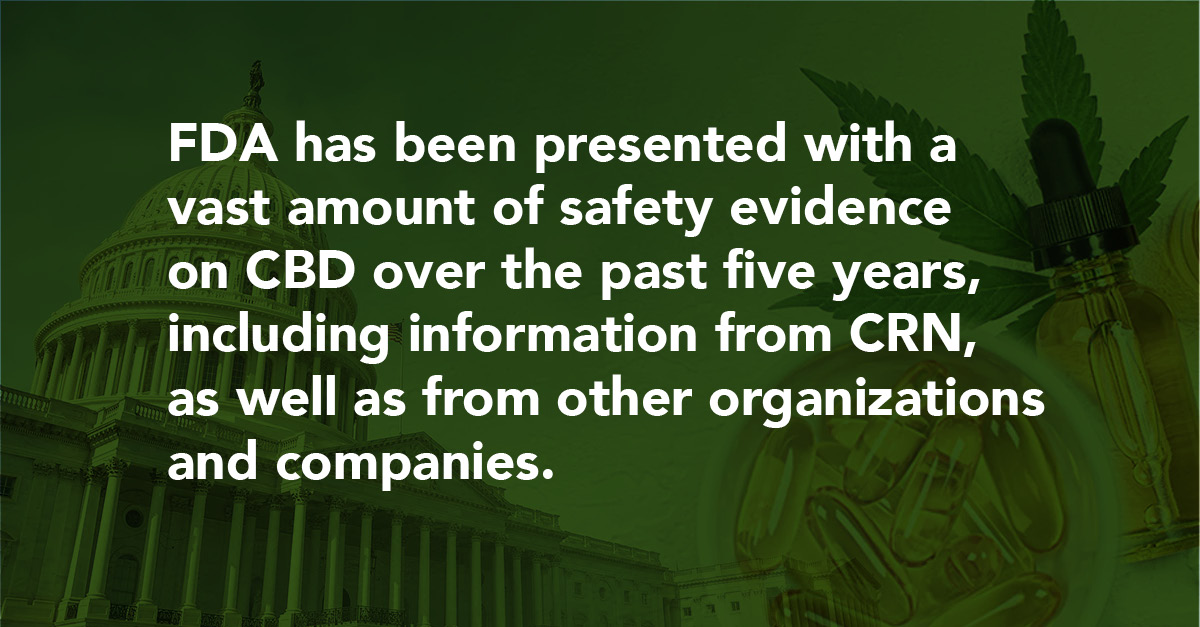JULY 27, 2023
WASHINGTON – The Council for Responsible Nutrition (CRN), the leading trade association representing the dietary supplement and functional food industry, today provided written testimony to the U.S. House of Representatives Committee on Oversight and Accountability, Subcommittee on Health Care and Financial Services, asking that Congress demand FDA complete the work Congress directed the agency to do under the 2018 Farm Bill by permitting CBD and other hemp-derived cannabinoids to be lawfully marketed as dietary supplements using the appropriate safeguards found in the existing law.
Lawmakers are currently examining the FDA's lack of regulatory oversight on hemp-derived CBD products. On Thursday, July 27, the subcommittee will conduct a hearing titled "Hemp in the Modern World: The Yearslong Wait for FDA Action.”
CRN’s submission comes in response to FDA’s declarations earlier this year: first asserting in January that the existing legal framework was not appropriate to regulate CBD products; and subsequently stating, during a stakeholder call the agency hosted in June, that it would request an entirely new regulatory framework for all cannabis products, ignoring the distinction Congress previously made between hemp and marijuana in the 2018 Farm Bill.
CRN has publicly called on FDA to act since 2018, and creating a legal pathway for CBD remains policy priority in 2023
While FDA first claimed in 2019 that CBD was precluded from use in dietary supplements due to a high-dose, highly purified form of CBD being approved in 2018 in the prescription drug Epidiolex, CRN contended that the agency currently has several options that would allow the inclusion of CBD in dietary supplements, and that Congress should inquire why none of these options have been pursued. CRN also refuted FDA’s claim that the agency lacks the safety data for CBD to appropriately provide safeguards for its supplement use. FDA has been presented with a vast amount of safety evidence over the past five years, including information from CRN, as well as from other organizations and companies. Additionally, other government bodies have established recommended maximum intake levels of CBD. Despite the plethora of safety data available to FDA, the agency continues to claim that adequate safety evidence is lacking.
In response to FDA’s conclusion that a new regulatory pathway for CBD is needed, CRN asserted that the current regulatory framework for dietary supplements provides ample tools by which FDA can mitigate risks and protect consumers, while allowing access to safe botanicals, like CBD. Other possible safeguards that FDA imagines for a new category of cannabis products could be achieved under the existing framework.
“The FDA is downplaying, underestimating, and misrepresenting its enforcement capabilities and consumer protection tools it already has for dietary supplements as a justification for establishing new staff and resources within the FDA, and a regulatory category that undermines and ignores the existing structure,” said CRN President and CEO Steve Mister. “Creation of this new framework would require substantial funding requests from Congress to set up and staff it; or, if the FDA instead decided to seek user fees on these products, doing so could ultimately raise costs for consumers. In the meantime, consumers are left to navigate the CBD marketplace without any guardrails imposed on these products, when a viable framework for dietary supplements already exists.”
Companion federal bills have recently been introduced in both the House and Senate to allow for the marketing of CBD and other hemp-derived products as dietary supplements.
The Council for Responsible Nutrition (CRN), founded in 1973, is a Washington, D.C.-based trade association representing 200+ dietary supplement and functional food manufacturers, ingredient suppliers, and companies providing services to those manufacturers and suppliers. In addition to complying with a host of federal and state regulations governing dietary supplements and food in the areas of manufacturing, marketing, quality control and safety, our manufacturer and supplier members also agree to adhere to additional voluntary guidelines as well as to CRN’s Code of Ethics. Follow us on Twitter @CRN_Supplements and LinkedIn.


